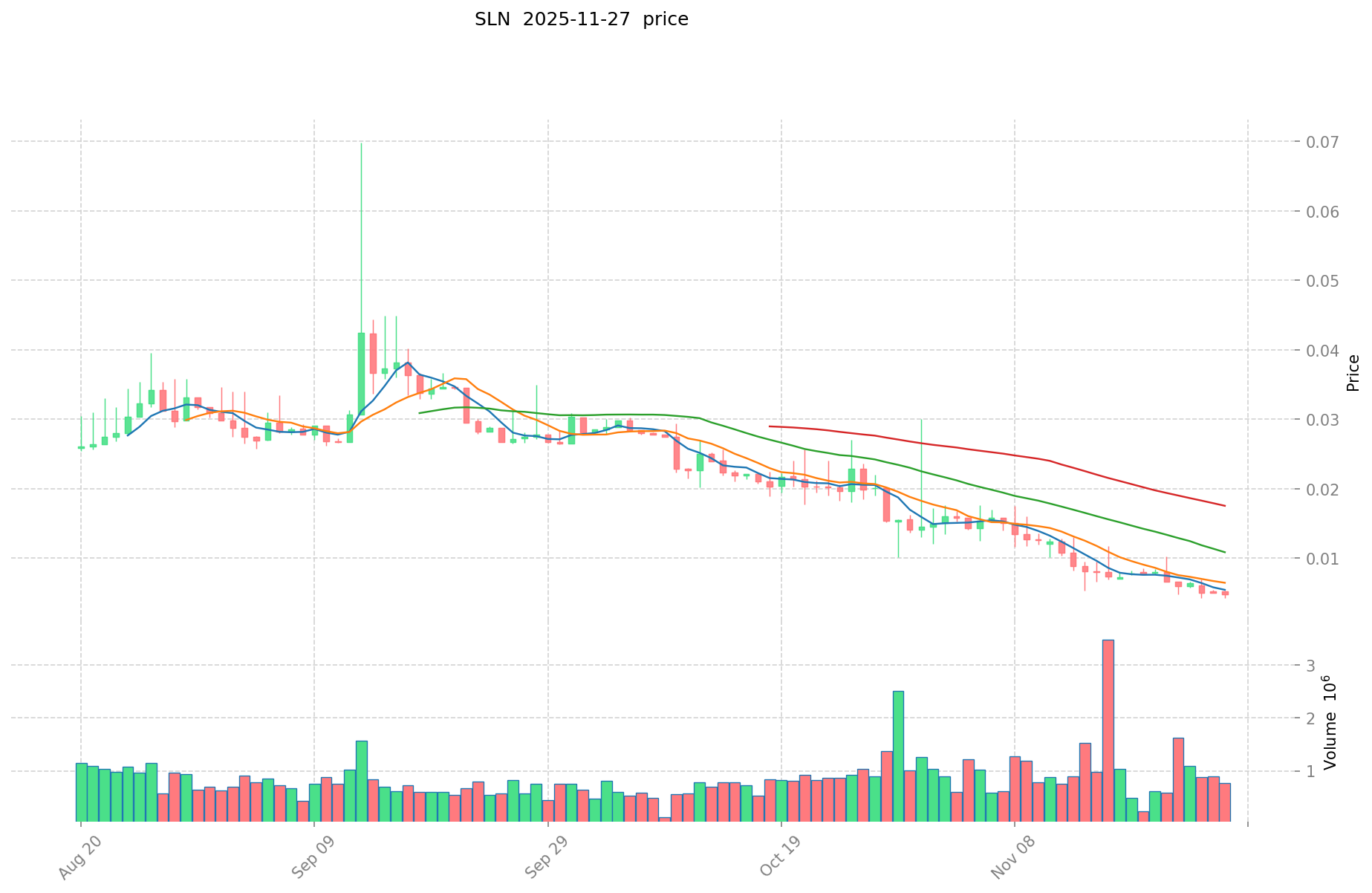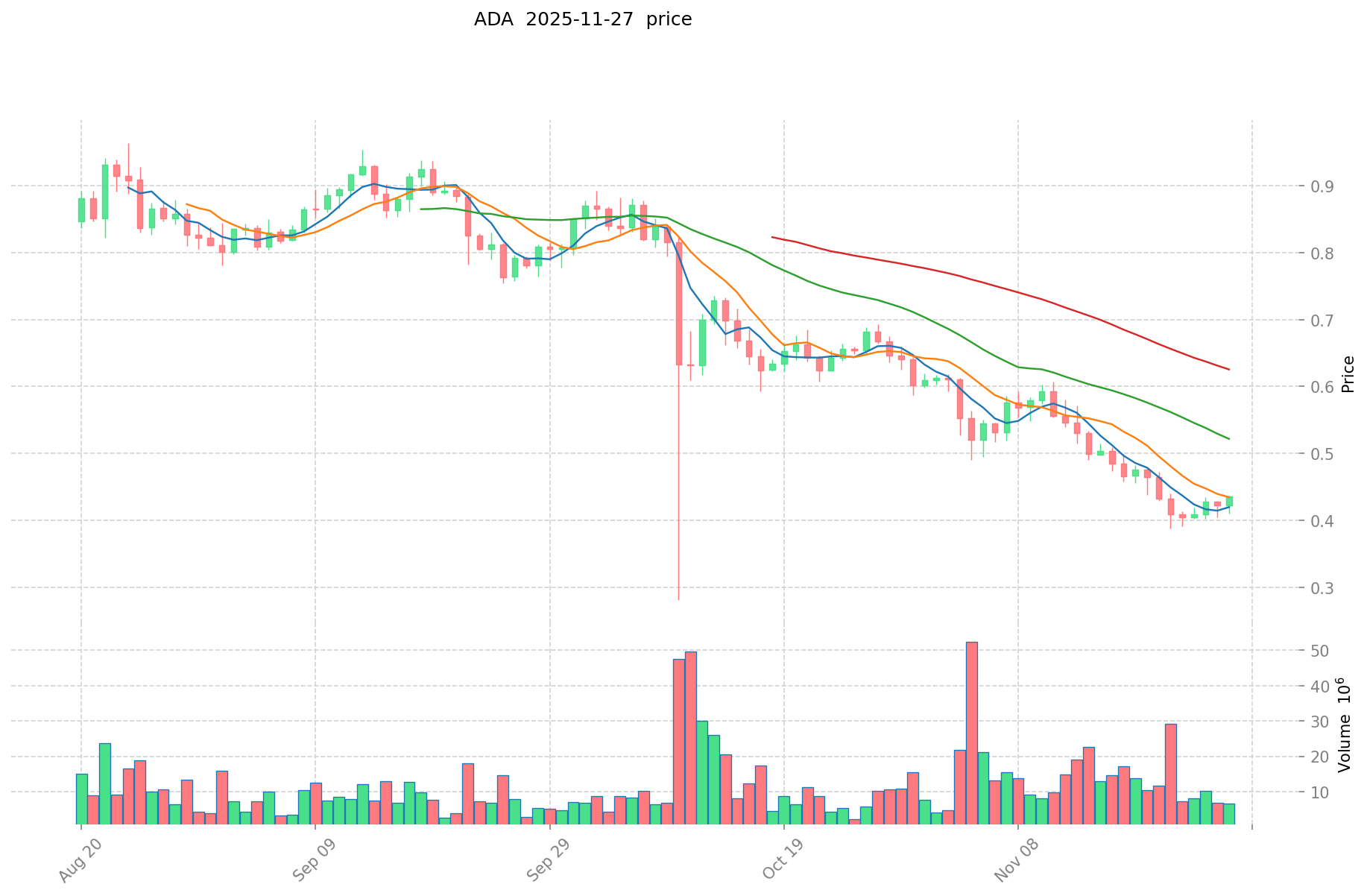SLN vs ADA: Comparing Two Innovative Approaches to Machine Learning Optimization
Introduction: SLN vs ADA Investment Comparison
In the cryptocurrency market, the comparison between Smart Layer Network Token (SLN) and Cardano (ADA) has been an unavoidable topic for investors. The two not only show significant differences in market cap ranking, application scenarios, and price performance but also represent different positions in the crypto asset landscape.
Smart Layer Network Token (SLN): Since its launch, it has gained market recognition for its innovative token standard ERC-5169 & TokenScript, which introduces a token front-end that can transform token liquidity and utility.
Cardano (ADA): Since its inception in 2017, it has been hailed as a technology platform capable of running financial applications used by individuals, organizations, and governments worldwide.
This article will comprehensively analyze the investment value comparison between SLN and ADA, focusing on historical price trends, supply mechanisms, institutional adoption, technological ecosystems, and future predictions, attempting to answer the question most concerning investors:
"Which is the better buy right now?"
I. Price History Comparison and Current Market Status
SLN and ADA Historical Price Trends
- 2024: SLN reached its all-time high of $12.3999 on February 23, 2024.
- 2021: ADA hit its all-time high of $3.09 on September 2, 2021.
- Comparative analysis: SLN has experienced a significant price drop from its all-time high, while ADA has also seen a substantial decline from its peak.
Current Market Situation (2025-11-27)
- SLN current price: $0.004572
- ADA current price: $0.4331
- 24-hour trading volume: SLN $2,602.97 vs ADA $3,785,028.44
- Fear & Greed Index: 22 (Extreme Fear)
Click to view real-time prices:
- Check SLN current price Market Price
- Check ADA current price Market Price


II. Key Factors Affecting Investment Value of SLN vs ADA
Supply Mechanism Comparison (Tokenomics)
- Solana (SOL): Inflationary model with a decreasing inflation rate. Initial inflation rate of 8%, gradually decreasing to 1.5% annually.
- Cardano (ADA): Fixed maximum supply of 45 billion ADA with a circulating supply around 35 billion.
- 📌 Historical Pattern: Fixed supply models like Cardano's tend to create scarcity value over time, while Solana's declining inflation model aims to balance network security with long-term value preservation.
Institutional Adoption and Market Applications
- Institutional Holdings: Solana has gained more institutional traction recently, with significant investments from major funds and venture capital firms. Cardano has established institutional partnerships but with less mainstream financial institution adoption.
- Enterprise Adoption: Solana has stronger adoption in DeFi and NFT markets due to its high throughput capabilities, while Cardano focuses on academic partnerships and developing-world applications.
- Regulatory Attitude: Both face similar regulatory scrutiny in major jurisdictions, with neither having significant regulatory advantages over the other.
Technical Development and Ecosystem Building
- Solana Technical Upgrades: Continuous improvements to address network stability issues, with recent protocol upgrades enhancing reliability and reducing outages.
- Cardano Technical Development: Formal development approach with peer-reviewed updates; recently implementing Hydra scaling solutions and focusing on Plutus smart contract optimization.
- Ecosystem Comparison: Solana demonstrates stronger performance in DeFi TVL, NFT market volume, and dApp adoption rates. Cardano offers a more methodical development approach with growing but smaller ecosystem metrics.
Macroeconomic Factors and Market Cycles
- Performance During Inflation: Neither has fully proven inflation-hedge characteristics, though both have shown some decorrelation from traditional markets during certain periods.
- Monetary Policy Impact: Both show sensitivity to Federal Reserve decisions and interest rate changes, typically with increased volatility during policy shifts.
- Geopolitical Factors: Solana benefits more from increased adoption in regions with advanced digital asset markets, while Cardano's focus on developing economies could provide resilience during geopolitical instability.
III. Price Predictions for 2025-2030: SLN vs ADA
Short-term Prediction (2025)
- SLN: Conservative $0.00390104 - $0.004433 | Optimistic $0.004433 - $0.00651651
- ADA: Conservative $0.242648 - $0.4333 | Optimistic $0.4333 - $0.619619
Mid-term Prediction (2027)
- SLN may enter a growth phase, with prices estimated between $0.004890051166 and $0.00827974572425
- ADA may enter a bullish market, with prices estimated between $0.4073743611 and $0.8035877808
- Key drivers: Institutional fund inflows, ETFs, ecosystem development
Long-term Prediction (2030)
- SLN: Base scenario $0.007550644652275 - $0.009325046145560 | Optimistic scenario $0.009325046145560 - $0.011099447638845
- ADA: Base scenario $0.87866296922124 - $0.975315895835576 | Optimistic scenario $0.975315895835576 - $1.071968822449912
Disclaimer: These predictions are based on historical data and market analysis. Cryptocurrency markets are highly volatile and subject to change. This information should not be considered as financial advice.
SLN:
| 年份 | 预测最高价 | 预测平均价格 | 预测最低价 | 涨跌幅 |
|---|---|---|---|---|
| 2025 | 0.00651651 | 0.004433 | 0.00390104 | -3 |
| 2026 | 0.00563899765 | 0.005474755 | 0.0049272795 | 19 |
| 2027 | 0.00827974572425 | 0.005556876325 | 0.004890051166 | 21 |
| 2028 | 0.00719504346561 | 0.006918311024625 | 0.004220169725021 | 51 |
| 2029 | 0.008044612059433 | 0.007056677245117 | 0.004375139891972 | 54 |
| 2030 | 0.011099447638845 | 0.007550644652275 | 0.005587477042684 | 65 |
ADA:
| 年份 | 预测最高价 | 预测平均价格 | 预测最低价 | 涨跌幅 |
|---|---|---|---|---|
| 2025 | 0.619619 | 0.4333 | 0.242648 | 0 |
| 2026 | 0.58963464 | 0.5264595 | 0.46328436 | 21 |
| 2027 | 0.8035877808 | 0.55804707 | 0.4073743611 | 28 |
| 2028 | 0.946336221306 | 0.6808174254 | 0.660392902638 | 57 |
| 2029 | 0.94374911508948 | 0.813576823353 | 0.7322191410177 | 87 |
| 2030 | 1.071968822449912 | 0.87866296922124 | 0.685357115992567 | 102 |
IV. Investment Strategy Comparison: SLN vs ADA
Long-term vs Short-term Investment Strategies
- SLN: Suitable for investors focusing on innovative token standards and potential ecosystem growth
- ADA: Suitable for investors looking for established platforms with academic backing and developing world applications
Risk Management and Asset Allocation
- Conservative investors: SLN: 10% vs ADA: 90%
- Aggressive investors: SLN: 30% vs ADA: 70%
- Hedging tools: Stablecoin allocation, options, cross-currency portfolios
V. Potential Risk Comparison
Market Risks
- SLN: High volatility due to lower market cap and trading volume
- ADA: Susceptible to overall crypto market trends and sentiment shifts
Technical Risks
- SLN: Scalability, network stability
- ADA: Development delays, smart contract adoption rate
Regulatory Risks
- Global regulatory policies may impact both differently, with ADA potentially facing less scrutiny due to its academic approach
VI. Conclusion: Which Is the Better Buy?
📌 Investment Value Summary:
- SLN advantages: Innovative token standard, potential for rapid ecosystem growth
- ADA advantages: Established platform, academic partnerships, focus on developing economies
✅ Investment Advice:
- New investors: Consider a smaller allocation to SLN for higher risk/reward, larger allocation to ADA for stability
- Experienced investors: Balanced approach with both, adjusting based on risk tolerance
- Institutional investors: ADA for long-term strategic investments, SLN for potential high growth opportunities
⚠️ Risk Warning: The cryptocurrency market is highly volatile. This article does not constitute investment advice. None
VII. FAQ
Q1: What are the main differences between SLN and ADA in terms of investment potential? A: SLN offers potential for rapid growth due to its innovative token standard and developing ecosystem, while ADA presents a more established platform with academic partnerships and focus on developing economies. SLN may be suitable for higher risk/reward opportunities, whereas ADA might be preferred for stability and long-term strategic investments.
Q2: How do the supply mechanisms of SLN and ADA compare? A: SLN's supply mechanism is not explicitly stated in the provided information. ADA has a fixed maximum supply of 45 billion tokens, with a circulating supply of around 35 billion. This fixed supply model tends to create scarcity value over time.
Q3: What are the current prices and market situations for SLN and ADA? A: As of 2025-11-27, SLN's price is $0.004572, while ADA's price is $0.4331. The 24-hour trading volume for SLN is $2,602.97, compared to ADA's $3,785,028.44. The Fear & Greed Index stands at 22, indicating extreme fear in the market.
Q4: How do institutional adoption and market applications differ between SLN and ADA? A: ADA has established institutional partnerships but with less mainstream financial institution adoption. It focuses on academic partnerships and developing-world applications. SLN's specific institutional adoption is not mentioned, but it's noted for its innovative token standard ERC-5169 & TokenScript.
Q5: What are the price predictions for SLN and ADA in the short, mid, and long term? A: For 2025 (short-term), SLN is predicted between $0.00390104 - $0.00651651, and ADA between $0.242648 - $0.619619. By 2027 (mid-term), SLN may reach $0.004890051166 - $0.00827974572425, and ADA $0.4073743611 - $0.8035877808. For 2030 (long-term), SLN is estimated at $0.007550644652275 - $0.011099447638845, and ADA at $0.87866296922124 - $1.071968822449912.
Q6: How should investors approach risk management when considering SLN and ADA? A: Conservative investors might allocate 10% to SLN and 90% to ADA, while aggressive investors could consider 30% SLN and 70% ADA. Risk management strategies include using stablecoins, options, and cross-currency portfolios for hedging.
Q7: What are the main risks associated with investing in SLN and ADA? A: SLN faces high volatility due to lower market cap and trading volume, as well as potential scalability and network stability issues. ADA is susceptible to overall crypto market trends and may face development delays and slow smart contract adoption. Both are subject to regulatory risks, though ADA might face less scrutiny due to its academic approach.
Share
Content